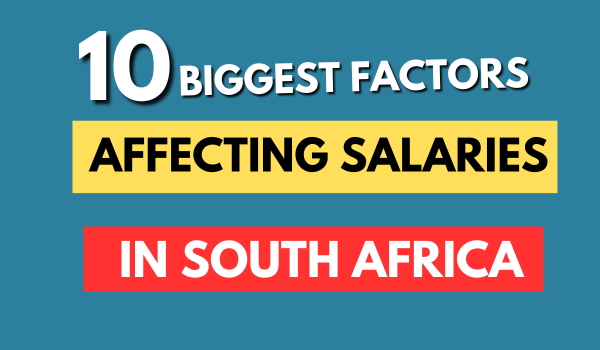In this article, you will get to know about the 10 Biggest Factors Affecting Salaries in South Africa: Facts You Must Know. Among all the countries, South Africa faces the highest level of inequality in the world. Due to this inequality, recipients face a skewed income distribution, regional disparities, and lack of opportunity with low growth and wages.
10 Biggest Factors Affecting Salaries in South Africa
The average salary of an individual is 31.1K ZAR per month, and due to Government wage policies, the cost of living with rising inflation, their job location, and certain other factors affect the salaries. To know furthermore details regarding the 10 Biggest Factors Affecting Salaries in South Africa, continue browsing this article.
For every working individual, the salaries are a main component. In South Africa, the average working salary for an individual is 31,100 ZAR, which totals 1,599 USD as per the latest exchange rate. South Africa significantly faces lower average salaries due to several factors that include the individual educational level, job title, and job type, and also depends on the sector that includes both the public and private.
|
Important Links |
The public sector workers earn 7 per cent more average total compensation than all the private sector across all the industries. However, the salaries in South Africa can also fluctuate with several Government policies, individual working locations, the rising cost of living, the demand and supply of specific skills, and trade unions.
The 10 Biggest Factors that are Affecting Salaries in South Africa are:
- Education: Education can improve gender equality, which is key to closing the income inequality gap. Due to the lack of education, the residents are facing a certain gender inequality gap.
- Inequality: South Africa is the most unequal country in the world, where individuals face differences in salaries and income differences with gender and cast.
- Physical Infrastructure: Due to the poor infrastructure, working employees fall with the poor working conditions. With that, they also deliver a lack of work and low-income wages.
- Inflation: With the rising cost of goods and services, employees are getting minimum salaries from employers and on that salary, the Federal Government added some policies.
- Working Location: Individual working location also affects salaries, Individuals who work in the public sector receive some benefits other the private sector workers. Along with this, employment can also contribute to some changes in the average salary of the working individual.

- Labour Laws: Due to this law, the employees are intended to protect the workers’ rights and ensure some fair treatment that includes the basic conditions of the Employment Act, Employment Equality Act, and labour relations act.
- Demand/ supply: The salaries also depend on the demand and supply, if the work is in that condition to have a rapid growth, the employees will also receive the lower income wages.
- Working hours: The salaries also depend on the individual working hours and your daily time period regarding your work, through which the employer will deliver you your salaries.
- Quit or leave your current job: Quitting or leaving the job also affects the individual salaries. For immigrants in South Africa, the workers are getting wages according to their gender and they also receive employment accordingly.
- Some other relevant factors include inflation, median salary, annual increment in salary, working experience, city, and others.
These are some Factors Affecting Salaries in South Africa, the employer provides the funds on the basis of the individual qualification. Employees who are highly educated and well qualified will receive sufficient salaries, but sometimes they also face some affecting factors.
|
Important Links |
Facts You Must Know
In South Africa, over the past quarter, households where specifically with 34% of the income increases. 44% of the African households are indicated with their unchanged income.
Yet 22% were noted with some certain reduction, which is figured out with the and varied with the stability across the population. The consumers remained optimistic with a higher than the expected inflation and risked their continuation with the hike cycle.
Some reasons for these changes in the current household salaries are lost jobs, starting a new business, working hours reduction, starting a new job, retiring, and owning a small business, which is order to the slowed growth.





